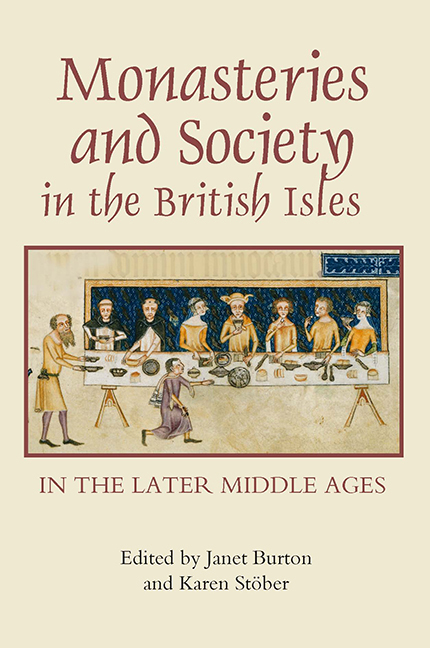Book contents
- Frontmatter
- Contents
- List of illustrations
- Acknowledgements
- List of contributors
- Abbreviations
- Introduction
- The Meeting of the Worlds
- 1 The social networks of late medieval Welsh monasteries
- 2 Cistercian hospitality in the later Middle Ages
- 3 Cistercians and border conflicts: Some comparisons between the experiences of Scotland and Pomerania
- 4 ‘Not a thing for a stranger to enter upon’: The selection of monastic superiors in late medieval and Tudor England
- Religious Houses and their Patrons and Benefactors
- Female Communities: Nuns, Abbesses and Prioresses
- Monasteries and Education
- Monasteries and Urban Space
- Religious Houses in the Regions
- Index of Religious Houses mentioned in the text
- Index
- Miscellaneous Endmatter
2 - Cistercian hospitality in the later Middle Ages
from The Meeting of the Worlds
Published online by Cambridge University Press: 24 October 2017
- Frontmatter
- Contents
- List of illustrations
- Acknowledgements
- List of contributors
- Abbreviations
- Introduction
- The Meeting of the Worlds
- 1 The social networks of late medieval Welsh monasteries
- 2 Cistercian hospitality in the later Middle Ages
- 3 Cistercians and border conflicts: Some comparisons between the experiences of Scotland and Pomerania
- 4 ‘Not a thing for a stranger to enter upon’: The selection of monastic superiors in late medieval and Tudor England
- Religious Houses and their Patrons and Benefactors
- Female Communities: Nuns, Abbesses and Prioresses
- Monasteries and Education
- Monasteries and Urban Space
- Religious Houses in the Regions
- Index of Religious Houses mentioned in the text
- Index
- Miscellaneous Endmatter
Summary
The monks of Meaux Abbey, Yorkshire, likely welcomed the General Chapter's decision that men and women of honest character might enter their abbey church to view the miracle-working crucifix recently commissioned by Abbot Hugh (1339–49). However, they were soon to regret this, for according to the chronicle of the house hoards of women flocked to the abbey not out of devotion, but rather to have a good look around the church and take advantage of the monks’ hospitality. No doubt news that the crucifix had been carved from a nude model had made a visit to Meaux all the more compelling. This lively account of curious Yorkshire women in the fourteenth century provides an appropriate opening for this analysis of Cistercian hospitality in the later Middle Ages. This paper begins by considering how central hospitality was to Cistercian life – and just how compatible, given that the White Monks sought to establish sites ‘far from the haunts of men’. It explores how the Order sought to welcome guests warmly without impeding the daily observance of monastic life. It moves on to discuss the recipients of Cistercian hospitality. Who visited these abbeys? Why? How were they provided for during their stay? A final section considers how important the Cistercians’ hospitality was to their friends, neighbours and passers-by. The analysis draws on material from England, Scotland and Wales to provide an overview of Cistercian hospitality from the thirteenth century until the Dissolution of the religious houses. It reflects work in progress since more extensive research is required to explore regional differences and also changes over time.
Hospitality and the Cistercians
Let all guests be received as Christ Himself for He will say, ‘I was a stranger and you took me in.’ And let fitting honour be shown to all, especially to those who are of the household of the faith and to strangers.
In chapter 53 of his Rule, Benedict addresses the reception of guests and makes hospitality an integral part of Benedictine life. As faithful devotees of the Rule, the Cistercians implemented Benedict's prescriptions to the letter. His instructions on hospitality are echoed – and modified – in the twelfth-century Cistercian customary, the Ecclesiastica Officia, which was the backbone of Cistercian observance from the twelfth century onwards.
- Type
- Chapter
- Information
- Publisher: Boydell & BrewerPrint publication year: 2008



